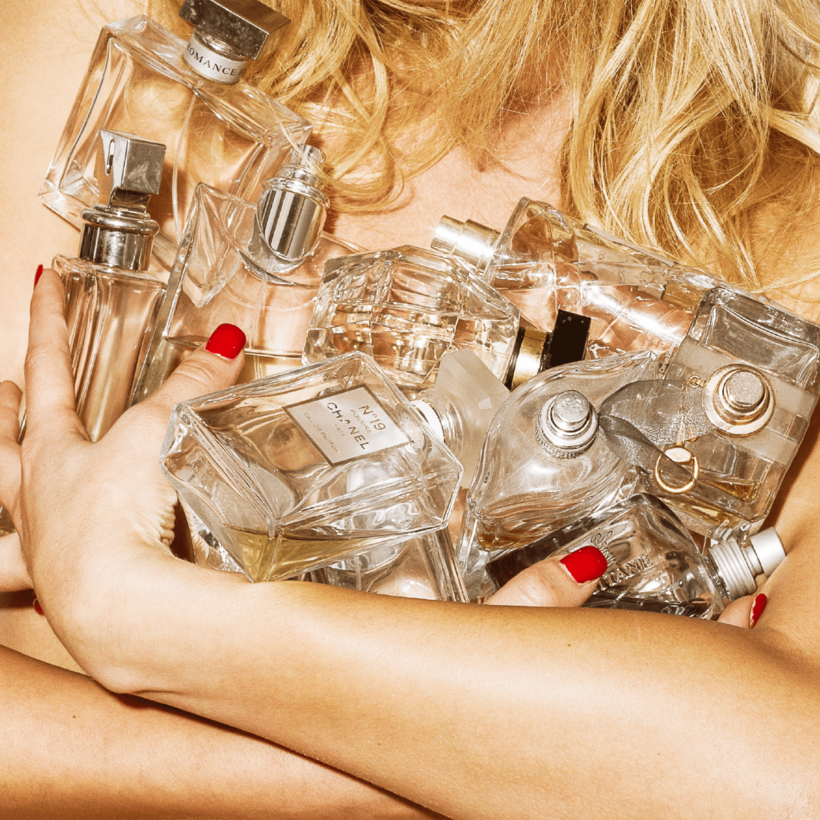“I just had no idea a smell could evoke a feeling like this,” exclaims TikTok user Christina Calcote, shaky with emotion. They lift the inside of their wrist to their nose again and again. They start to speak and then stop, as though close to sobbing. “You know when you’re snuggled up with someone?” they finally manage to say, pushing their arms together to mime snuggling on someone’s chest. “It sure isn’t helping my loneliness, I can tell you that much!” they blurt out to the camera after taking another huge whiff of their own wrist.
“You know when you’re” is the essential molecule of PerfumeTok, the fragrance-obsessed corner of TikTok, where this post went viral late last year. The revelation that “a smell could evoke a feeling like this” is PerfumeTok’s—and its sister hashtag, FragranceTok’s—unifying thesis.
PerfumeTok posts are often miniature personal essays. Descriptions of scents lean heavily toward the lyrical, poetic, and free-associative. Reviewers throw in technical terms—sillage, aldehydes, Iso E Super, top notes—but where they really soar is on loneliness, longing, guilty pleasures, or secret desires. Some reviews, and reviewers, take a more academic or scientific approach, but the majority start with feelings—big, big feelings.
I wasn’t even mildly interested in fragrance until my mid-20s. I thought that perfume was only for a certain type of woman, someone from old money who chose one fragrance—expensive, discreet, correct, probably Chanel No. 5. Once this woman found her signature scent, she wore it for the rest of her life.
Smell, on the other hand, was fascinating. I loved smell’s hardwired connection to memory. The aroma of salt air or warm bread could telescope time and distance down to nothing. Then there was its intrinsic link to romantic and sexual attraction, how another person’s sweaty body might smell fantastic to me and terrible to the next person. Smell was gross, which meant it was exciting. It was the kind of thing you weren’t supposed to talk about. Even just the word “smell” was sort of uncouth, indicating armpits and fluids, trash cans and toilets. Smell was sex and loneliness; perfume was a rich woman in a department store.
I was a kid in the 1990s, and that era’s innovations in fragrance grew from a disdain for traditional perfumery. The aggressively clean nothing-smell of CK One promised that you could wear perfume without smelling like perfume, or flowers, or anything at all. The Gap’s wildly popular one-word fragrances (Grass, Heaven, Dream) knew that you were cooler than your great-aunt’s bottle of Fracas. Christopher Brosius co-founded Demeter (a precursor to his more baldly named line, CB I Hate Perfume), whose small, unadorned bottles offered everyday, unglamorous smells such as Dirt or Snow. The first thing I knew about perfume, growing up, was that it was trying very hard not to be perfume.
Years later, my best friend, a knowledgeable and passionate obsessive, introduced me to the fragrance-head side of the Internet, where people approached perfumes the way nerds approached comic books. On forums and in blogs, reviews were emotional, swooning, and operatic, scattered with confessional anecdotes and flowery adverbs. I discovered niche and indie perfumes that sought to evoke stranger, grimier smells: a forest after a rain, slick rainbow puddles of gasoline on asphalt, the cumin-y tang of a warm body in the morning, the sharp comfort of a worn leather jacket on a cold day, and the way tuberose can smell like heavenly white flowers or mothballs and hospitals, depending entirely on the skin chemistry of the wearer. I made new friends through our shared hobby, delved into the minute dramas of related online communities, and discovered that a lot of the fragrances I’d disdained as “old-lady perfumes” were (just like old ladies themselves) far stranger and wilder than I could have imagined.

The same revelations and discoveries I once unearthed on the smell-obsessed corners of the Internet are now served up by a new generation on my TikTok’s “For You” page. PerfumeTok—with all its videos of young people smelling their wrists and weeping—has grown meteorically in the last three years or so. And with it, the concept of fragrance as something younger, cooler, and more personal. You don’t need to know anything about aldehydes or base notes to know that a smell reminds you of your first kiss, or a deliciously bad relationship, or a warm summer night near the ocean, or the bathroom in your mom’s house and the hour you spent hiding there during a family holiday.
Perfume lends itself naturally to emotion. While all beauty products are subjective (the same lipstick might look great on one skin tone and terrible on another), perfume may be the most subjective of all. Reactions to scent are irrational, living at the intersection of hormones and memory. I can look up the materials in a fragrance, learn how it was composed, guess at its staying power based on concentrates and synthetics, but none of this information tells me whether I’ll like it. That final step is a mystery: maybe a result of the perfumer’s enfleurage technique, or maybe the smell of a shirt my first boyfriend once wore.
Back when I was getting into fragrance, perfume blogging assisted in the rise of D.S. & Durga, Etat Libre d’Orange, Le Labo, and Byredo. On PerfumeTok, many of these same brands, and even the same specific fragrances, are still popular. The friend who introduced me to niche fragrance wore L’Artisan Parfumeur’s Dzing!, a glorious hay-and-leather blend meant to evoke a 19th-century Parisian circus tent. I was astonished to find that Dzing! was one of the fragrances most adored by a popular creator on PerfumeTok, Scout Dixon West, despite the fact that it was discontinued years ago.
While traditional signature scents likely persist somewhere, perfume as a canvas for individual expression moves ever closer to the default. Perfume is the only area of the beauty industry that’s seen growth rather than decline in the last few years. Perhaps that’s because it’s the only one offering a window to our inner selves, rather than flinging our outer images back at us.
We want to share our memories, we want to understand how they shaped us, and we want to explore who else we could become. Today I may want to be a grande dame in white florals, tomorrow, maybe a greasy-haired boy on a motorcycle. It’s possible that the whole idea of signature scent has not disappeared, but rather its meaning has expanded. A signature can be different each day, and yet still equally true.
Helena Fitzgerald has written for The Cut, Elle, The Atlantic, Wired, the New Republic, and GQ. She lives in Manhattan, where she most often smells like Serge Lutens’s Gris Clair (old formulation) or Marissa Zappas’s Sun Card




